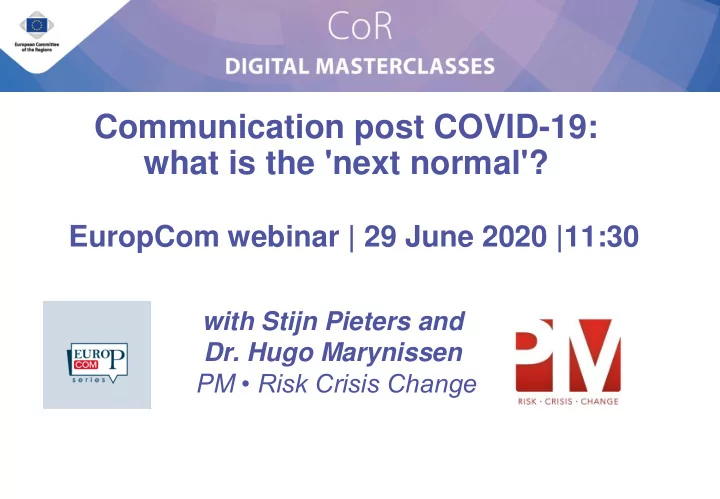

Communication post COVID-19: what is the 'next normal'? EuropCom webinar | 29 June 2020 |11:30 with Stijn Pieters and Dr. Hugo Marynissen PM • Risk Crisis Change
Learning from a pandemic while preparing for global recession the political edition by Pieters & Marynissen The vital importance of crisis communications in how to cope with wicked problems through transdisciplinary collaboration.
Just sit back and relax, it will be fun. Really.
Why crisis communications is important? POLITICAL COMMUNICATIONS CRISIS COMMUNICATIONS - Putting forward problem - Express emotional involvement - Communicate position - Notice emotions of public - Persuade to adopt policy - Analyse and define uncertainty - Take away uncertainty by: - Attack/Defend policies -- Communicate unambiguous -- Reluctance to simplify -- Remain consistent (but agile) Sense – analyse/categorize – respond Act - Sense - Respond Probe – sense – respond
The crisis cycle Turner, 1978 Lauder & Pieters, 2019
Why politicians loose their job over crisis communications? Window of recovery phase: repeating pattern + evocative + emo/ethics thus: Trust Crisis phase (Hell / Recovery): failing leadership expressed by partners thus: Trust Adjusting phase: not the right manager for the adjusted objectives thus: Trust
Summary Do we live in an ordered world where exceptionally things become chaotic? (Option 1) (OR) Do we live in a chaotic world where we manage to create a few oases of order? (Option 2)
Politicians are ‘crisis managers’. What is that? Tame problems need a rational power. A manager providing the right process . Critical problems need a coercive power. A commander providing the answer . Wicked problems need an emotional power. A leader asking the right question .
It’s a wicked problem …
… in a chaotic univers
PM’s catalytic framework for chaos Ask the right questions Marynissen & Lauder, 2018
Governance Focus on structure Management Operations Communication Pieters & Marynissen, 2017
Proces Proces Proces Proces
van den Oord, et al. 2020
The power of the network in a wicked problem Cambré, Marynissen & Van Hootegem, 202
Identify the needs and wants of the network
Perception Perception inside outside (crisis team) (those affected) OUR CRISIS THE CRISIS
3 stages of perception analysis Analyzing Data Preparing advice Collecting data Analyzing data Brugghemans & Van Achte, 2018
How we identify patterns & structure in a vast amount of unstructured, raw data Marynissen et al, 2018; 2020
Example: Students analysis NCCN
Key Take-Aways 1. Crisis communications is about acting, sensing and responding meaning putting yourselves in a vulnerable position ready to earn trust . 2. Dealing with wicked problems in a chaotic universe working against you is about asking the right questions and governing your transdisciplinary network of networks. 3. To know your network you need data. By analysing this data you generate crisis intelligence. Decision makers need more intelligence and less data .
Thank you for watching! • Fill in the evaluation poll: Go to Sli.do, enter #VirtualEuropcom • The recording of this webinar will be available to the participants • Follow the European Committee of the Regions on social media Twitter: @EU_CoR Instagram: @eu_regions_cities Facebook: European.Committee.of.the.Regions Linkedin: European Committee of the Regions
Recommend
More recommend